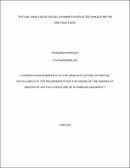| dc.description.abstract | The study examines the social dynamics in Ankole oral narratives specifically myths and folktales. The research gap that this study addresses arises from the fact that none of the previous studies has examined the philosophy that underpins the sociology-cultural and economic development of the Banyankole as reflected in their oral narratives. The study is library and field research based. It applies qualitative methods of data collection and analysis. Libraries provide the reading materials in form of books, journal articles and periodicals. These materials provide for this research the theoretical basis needed for the interpretation of data. Field research forms the biggest portion of this study since it is the source of primary data. Data collected from the field using observation, interview guide and focus group discussion is transcribed, translated into English, classified and analyzed using the Marxist literary theory’s tenets of economic base and superstructure of any given society. The study aims at establishing the characters’ perception and exercise of power and leadership. The findings of the study reveal that acquisition of wealth is a prerequisite to ownership of power. This wealth is measured by accumulation of many heads of cattle. While examining the economic activities and the production relations between bahima and bairu, the study reveals that there is innate love for cattle and every new generation that comes is determined to keep the tradition of cattle keeping. As well, crop farming is an essential activity which is cuurently carried out alongside cattle keeping. The two activities have boosted the economic base of Ankole people. The study also examines ethnic stereotyping of the characters portrayed in folktales. The findings reveal that the bairu and bahima still live an antagonistic relationship characterized by different stereotypes against each other. Each group identifies itself with particular characteristics and hence it becomes hard for the two groups to freely mingle. | en_US |

